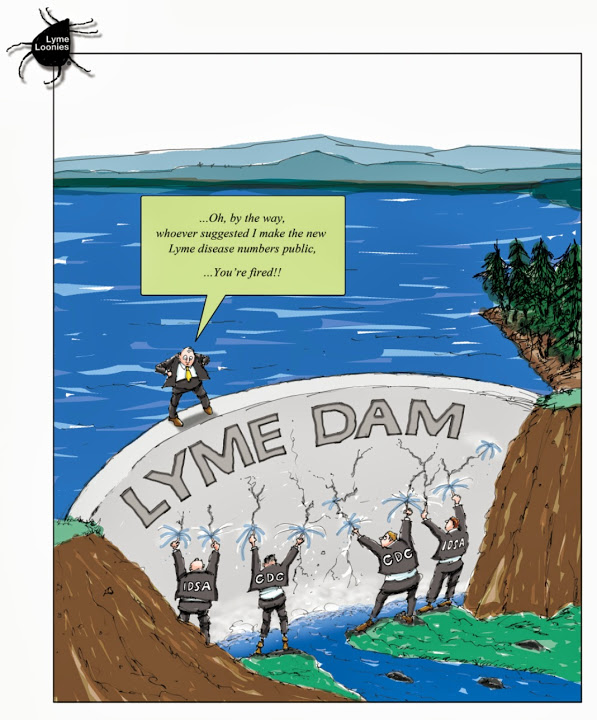
Fake news or scientific misconduct?
Written by Huib, published Saturday March 4th, 2017
I understand this article, False and Misleading Information about Lyme Disease (cited as Shapiro ED, Baker PJ, Wormser GP, False and Misleading Information about Lyme Disease, The American Journal of Medicine (2017), doi: 10.1016/j.amjmed.2017.01.030.) is considered a research article supported by a NIH translational research grant.
Research, as defined by NIH, “means a systematic experiment, study, evaluation, demonstration or survey designed to develop or contribute to general knowledge (basic research) or specific knowledge (applied research) relating broadly to public health by establishing, discovering, developing, elucidating or confirming information about, or the underlying mechanism relating to, biological causes, functions or effects, diseases, treatments, or related matters to be studied.”
At the bottom of this article is the following disclosure: Funding: This publication was made possible in part by support from CTSA Grant Number UL1 TR001863 from the National Center for Advancing Translational Science (NCATS), a component of the National Institutes of Health (NIH), to EDS [ED Shapiro]. The findings and conclusions of this paper are those of the authors and do not necessarily represent the official position of the NIH.
This article meets none of the research grant objectives. However, it certainly appears to show ‘research misconduct’ according to CFR › Title 42 › Chapter I › Subchapter H › Part 93 › Subpart A › Section 93.103 or 42 CFR 93.103 – Research misconduct.
“Research misconduct means fabrication, falsification, or plagiarism in proposing, performing, or reviewing research, or in reporting research results.
(a) Fabrication is making up data or results and recording or reporting them.
(b) Falsification is manipulating research materials, equipment, or processes, or changing or omitting data or results such that the research is not accurately represented in the research record.”
The research article by Shapiro, Baker and Wormser makes numerous fabrications and reports of false data:
1. [fake news on Lyme] “is increasing in frequency and prominence, creating much confusion among primary care physicians and their patients.” There is nothing cited or studied to substantiate this fabrication
2. The following statement appears nonsensical – it is also a guess or fabrication as the reference cited does not support the statement. “Many patients with symptoms attributed to chronic Lyme disease likely come from these groups [30% of the population that suffer from chronic pain] that share similar symptoms and personal experiences” cites Feder HM Jr., Johnson BJ, O’Connell S, et al. A critical appraisal of “chronic Lyme disease”. N Engl J Med 2007;357:1422-30.
3. “Although there are multiple definitions of chronic Lyme disease, we are using the term to refer to patients with persistent, unexplained subjective symptoms, with no documented history of Lyme disease and without credible laboratory evidence –past or present– of infection with Borrelia burgdorferi, the bacterium that causes Lyme disease.”
The authors define the chronic Lyme term as though it is not a real medical condition. The authors then ineptly promote the slanderous and indefensible falsehood that clinicians and patients who use the term chronic Lyme are using the authors’ definition. There is no proof of this fantasy.
4. “Health care providers who diagnose chronic Lyme disease question the reliability of 2- tier antibody-based tests for Lyme disease approved by the Food and Drug Administration (FDA)”
This statement requires some parsing: this article cites four health care providers who treat patients with complicated and persistent cases of Lyme – not one of these four providers use the authors’ definition of chronic lyme disease.
However, many researchers, clinicians and patients question have rightly questioned the reliability of the 2-tier test… as the many studies [listed in the image above this blogpost] note:
The chart is adapted from Stricker, R. and Johnson, L., Lyme disease diagnosis and treatment: Lessons from the AIDS epidemic.Minerva Med. 2010; 101: 419-25.
Another study found the 2-tiered tests miss 88 of every 200 patients with Lyme disease. By comparison, AIDS tests have a sensitivity of 99.5%—they miss only one of every 200 AIDS cases. Stricker RB, Johnson L. Let’s tackle the testing. BMJ : British Medical Journal. 2007;335(7628):1008. doi:10.1136/bmj.39394.676227.BE. https://www.ncbi.nlm.nih.gov/pmc/articles/PMC2078675/. Accessed December 14, 2016.
The recommended 2-tiered tests average 40 percent accuracy for females and 50 percent accuracy for males. Brief Report Sex Differences in the Clinical and Serologic Presentation of Early Lyme Disease: Results from a Retrospective Review Alison Schwarzwalder, Michael F. Schneider, Alison Lydecker, John N. Aucott, GENDER MEDICINE/VOL. 7, NO. 4, 2010 Accepted for publication May 18, 2010. doi:10.1016/j.genm.2010.08.002
According to a 2016 meta-analysis of Food and Drug Administration (FDA) cleared Lyme disease tests, tests averaged from 30.6% to 86.2% in accuracy. The two-tier methodology endorsed by the CDC had a 53.7% sensitivity. Commercial test kits for detection of Lyme borreliosis: a meta-analysis of test accuracy Michael J Cook and Basant K Puri International Journal of General Medicine 2016:9 427–440 ]
5. The following statement connects two true facts with a false conclusion….there have been no studies that support this sweeping fantasy finding.
“Lyme disease patient advocates have lobbied state legislatures in both Maryland and Virginia to pass laws that require physicians to inform their patients that a negative result from an FDA-approved diagnostic test does not necessarily mean that they do not have Lyme disease.” TRUE
This casts doubt on the validity of approved diagnostic tests “TRUE
“and encourages seronegative patients with chronic non-specific symptoms to seek treatment for their symptoms with prolonged courses of antibiotics, often at great personal expense and to the detriment of their health” FALSEHOOD
6. The following statement takes the falsehood of the previous finding and links it to studies as though there is a causal relationship. There is no causal relationship and there are numerous studies that show additional treatment is helpful.
“This occurs despite results of multiple clinical trials that show that patients with well-documented Lyme disease who have residual nonspecific symptoms after treatment do not benefit from additional treatment, even with extended courses of IV antibiotics” according to one of many studies supporting ‘additional’ treatment. DeLong, AK, Blossom, B., Maloney, EL., Phillips, SE. (2012) Antibiotic retreatment of Lyme disease in patients with persistent symptoms: A biostatistical review of randomized, placebo-controlled clinical trials. Contemporary Clinical Trials, 33(6):1132-1142.
7. “It is highly implausible that either patients with chronic Lyme disease or patients who had Lyme disease and have post-treatment symptoms, who are seronegative, who have no objective findings, and who have already been treated extensively with antibiotics would have cultivable B. burgdorferi in their blood. Nevertheless, fake research has been used to support this notion.”
The authors have omitted to note the many peer-reviewed ‘non fake’ studies that confirm “patients with chronic Lyme disease or patients who had Lyme disease and have post-treatment symptoms, who are seronegative, who have no objective findings, and who have already been treated extensively with antibiotics would have cultivable B. burgdorferi in their blood”…synovial fluid, ligamentous tissue, iris, etc. etc. etc.
This appears to be a falsification of facts.
Some examples of non-fake studies showing persistent infection follow:
Preac-Mursic V, Weber K, Pfister HW, Wilske B, Gross B, Baumann A, Prokop J. Survival of Borrelia burgdorferi in Antibiotically Treated Patients with Lyme borreliosis. Infection 1989;17:355-359.
Preac-Mursic V, Pfister HW, Spiegel H, Burk R, Wilske B, Reinhardt S, Bohmer R. First Isolation of Borrelia burgdorferi from an Iris Biopsy. J Clin Neuro-ophthalmol 1993;13:155-161.
Haupl T, Hahn G, Rittig M, Krause A, Schoerner C, Schonherr U, Kalden JR, Burmester GR. Persistence of Borrelia burgdorferi in Ligamentous Tissue from a patient with Chronic Lyme borreliosis. Arthritis & Rheumatism 1993;36:1621-1626.
Lawrence C, Lipton RB, Lowy FD, Coyle PK. Seronegative Chronic Relapsing Neuroborreliosis. Eur Neurol 1995;35:113-117.
Liegner KB, Shapiro JR, Ramsay D, Halperin AJ, Hogrefe W, Kong L. Recurrent erythema migrans despite extended antibiotic treatment with minocycline in a patient with persisting Borrelia burgdorferi infection. J Amer Acad Derm 1993;28:312-4.
Nocton JJ, Dressler F, Rutledge BJ, Rys PN, Persing DH, Steere AC. Detection of Borrelia burgdorferi DNA by Polymerase Chain Reaction in Synovial Fluid From Patients With Lyme Arthritis. N Engl J Med 1994;330:229-234.
NIAMSD & NIAID Clinical Courier. Vol. 9, No. 5 August 1991. ISSN 0264-6684. Diagnosis and Treatment of Lyme Disease.
Embers ME, Barthold SW et.al. Persistence of Borrelia burgdorferi in Rhesus Macaques following Antibiotic Treatment of Disseminated Infection. PLoS One 7(1):e29914.
Marques A et. al. Xenodiagnosis to Detect Borrelia burgdorferi Infection: A First-in-Human Study. CID. February 11, 2014
Hodzic E et. al. Resurgence of Persisting Non-Cultivable Borrelia burgdorferi following Antibiotic Treatment in Mice. PLOS ONE. 9: January 2014 Issue 1 e86907
8. “One astounding claim is that Lyme disease is sexually transmitted.”
In this case, the authors are clearly falsifying this study’s data – see the excerpt from the reference regarding sexual transmission. Abstract …”Although the likelihood of sexual transmission of the Lyme spirochete remains speculative, the possibility of Lyme disease transmission via intimate human contact merits further study.”
9. The authors accuse mainstream news media of “sensationalizing controversial aspects of patients’ stories” and media-sponsored public discussions of using “a format based on false equivalency”
The supporting citations provided are singular examples and do not support these sweeping accusations. These appear to be fabrications.
10. The authors state “Politicians [are] …attempting to displace mainstream physicians as diagnosticians in the complex world of Lyme disease by passing legislation that encourages the use of unproven treatments and that requires health insurance companies to pay for unsafe remedies with no documented benefit and well documented adverse effects.”
This is another case of falsified data. In reality, there is no Lyme legislation that encourages any particular treatment protocol. The laws are concerned with protecting patient rights to treatment options and, depending upon the state, requiring insurance coverage for such options. Furthermore, these legislators were representing their constituents, every day people, and this is how our democratic system is supposed to function.
To my understanding, this research document represents significant research misconduct meaning ‘fabrication and falsification and in reviewing research and in reporting research results’. I understand this falls under your jurisdiction of responsibility as it violates 42 CFR 93.103 – Research misconduct.
I have easily generated as much text revealing these falsehoods and fabrications regarding the ‘reviewing and reporting of results’ as the amount of text in the actual research document.
I did not use the legalese language found under 42 CFR 93.103 in the other two analyses I shared. However, these research articles, representing 22 million dollars in grant support, show the same patterns of research misconduct.
Who is responsible for allowing my tax dollars to be wasted on research misconduct that belittles and slanders those who care for persons living with persistent and complicated cases of Lyme disease and slanders and trivializes the patient group itself?
Would HHS and NIH allow for such research articles about rheumatoid arthritis patients be published? Or persons with multiple sclerosis or diabetes? A quick internet search will show these patient groups also have the occasional con trying to sell them snake oil, but they are not smeared as a group. And, the demands by diabetes advocates to have more sensitive tests have not been met with screeds by the researchers claiming to be concerned with the diabetes patient group. Can you even imagine that happening?
I am starting to feel there is a clear double standard with regards to the bullying and slander permitted against the Lyme patient group. After all, 30 million research dollars have been used to support research publications ‘that advance no knowledge or understanding’.
Please let me know who – if not you – is responsible for addressing this research misconduct and waste.
Thank you very much.
Jenna Luché-Thayer
Director, Ad Hoc Committee for Health Equity in ICD11 Borreliosis Codes
Founder, Global Network on Institutional Discrimination™ – Holding institutions accountable for political and scientific solutions
Note: dr. Wormser however seems to believe that he and his IDSA colleagues deserve the Nobel Prize in Medicine. You can read more about him and the role of the IDSA in ‘Shifting the Lyme Paradigm‘.

"This book perfectly describes the plight of millions of patients, who suffer from chronic Lyme Disease in many countries all over the world."
Prof. Christian Perronne, France
"This book is a gift of truth and passion to humanity."
Mia Morales, Lyme patient, USA
"I received the book exactly on the day that I had decided to end my life. Huh?! Yep. I am 35 years old years and have been ill for 19 years. Now I know why: Lyme. Everyone should read this book!"
Miranda, the Netherlands
"This book offers a new practical, human centered way of dealing with health information. It is also ringing a bell for the new time how to work together towards health and thriving."
Kim Schimmler, MD, Germany
"This pioneer's work made it perfectly clear that, when "i" becomes "we", even illness becomes wellness."
Frans Vermeulen, journalist, the Netherlands
"In his crucial work on Lyme disease, dedicated social researcher Huib Kraaijeveld does not pretend to have all the answers, but guides us towards asking the upsetting and essential questions."
Prof. Cees Hamelink, professor Communication Sciences & Human Rights, the Netherlands
"This book reads like a thriller! It touched me deeply and I am sure it will change the course of history."
Linda Graanoogst, journalist, the Netherlands
"Well, I am wiping my eyes and blowing my nose, while tears stream down my face. I guess that is a good sign. You hit the nail on the head claiming that Lyme survivors need 'understanding'. I would like my own partner to read this book."
Anodea Judith, PhD & author, USA
"What an awakening perspective! Huib has successfully set a quantum leap for understanding and managing Lyme disease by common people."
John Wong, bestselling author, Singapore
"A true and unpretentious caretakers' guide to understand Lyme. This book will help you to completely understand what your friend is going through; regardless of the symptoms they have. I wish it had been written ten years ago, because it can actually save lives!"
Cheryl Versalle, Lyme patient, USA
"This book actually speaks to people beyond its target audience (caretakers of people with Lyme Disease): people like me who are not travel companions, but to whom it is not hard at all to have or develop understanding and compassion. This makes the reach of this book bigger, much bigger if you’d ask me. I am amazed a book can do all of this!"
Saskia Steur, business blogger, the Netherlands
"This book reads like an exciting novel, were it not that it concerns a deadly serious issue. It calls to contribute and take care of each other and our world. Read, weep, feel and act!"
Manfred van Doorn, leadership expert, the Netherlands
"A creative and very intelligent vision to dive even deeper into the world of Lyme, to look at yourself, other people, but also the entire world around you."
Friend of someone with Lyme
"The book indicates that Lyme disease can be a sexually transmitted disease. This will cause a tidal wave of awareness all over the world. Like the child in the old fairy tale The Emperor’s New Clothes, who exclaimed: 'But the emperor is wearing no clothes!'"
Ola Aniel Petterson, STD campaign leader, Sweden
"What a brilliant sociological work! I am sure it will have much impact."
Professor Neuropathy, Germany
"This book is a big eye opener. Both for friends of people with Lyme disease as well as for people with Lyme. Or for any other health issues, for that matter."
Martin Möhrke, medical research leader, Europe
"I cannot read any other book for more than two minutes now, in this hell called Lyme. Yet yours I cannot stop reading! I should have put it away hours ago to clean the house. But I simply cannot stop."
Ineke, wife of a husband with Lyme, the Netherlands
"This book is a delight to read. It offers soft candlelight and warm campfire camaraderie on an often dark and lonely journey."
Laura Bruno, medical intuitive Lyme expert, USA
"A very honest and yet witty way of helping those with Lyme disease. This book is full of ideas on how to help your friend with Lyme, as a travel companion on this crazy journey called 'Lyme'."
Lisa Hilton, Lyme advocate, USA
"Both the personal experiences as well as the author’s sharp mind turn this into an incredibly inspiring book that raises the consciousness of its readers."
Kara, ex Crohn disease patient, the Netherlands
"Tempting, informative and eminently readable! Shifting the Lyme Paradigm is an absolute eye-opener for those who are not aware of what the journey of Lyme disease entails."
Terri Mackinnon-Cross, CEO WorldLymeDay.com, Canada
"This book gave us the recognition and acknowledgment, which were like a band-aid on an open wound."
Sara, Lyme patient, Belgium
"Very insistently written based on intensive, almost existential, personal experiences, this book also gives a clear overview of all relevant information for both patients and caretakers."
Jan Eendebak, former chairman Lyme Foundation STZ, the Netherlands
"A relief to read, written by an expert who shares his dedication to his own path with us, and brilliantly written."
Muna, mother of a daughter with chronic Lyme, the Netherlands
"Playful, frightening, informative and encouraging."
Merel, kinesiologist, the Netherlands
"This book made me realize that there is too little known behind the phenomenon Lyme. In a challenging manner the author provides understanding of Lyme disease and suggestions for tackling this disease. I have 'prescribed' this book to many of my patients and mostly astonishment was soon followed by recognition. An absolute must for anyone with (still) unexplained symptoms or the people close around them."
Duco Kanij, osteopath, the Netherlands
"This book guides you through the labyrinth of Lyme swiftly, while it took us YEARS to even get this far."
Eugenie van der Linden, ex-Lyme patient and therapist, the Netherlands
"This book is an absolute 'must read' for everyone! For patients, for family and friends, and for doctors who can finally learn that Lyme is more than what is written in their textbooks and that they should not be able to dismiss "unexplained" complaints as psychological too quickly!"
Anne Fierlafijn, MD, Belgium
"Shifting the Paradigm of Lyme is not like any other book on Lyme that I have read. It appeals to a higher consciousness, and is analytical in an introspective way that is pleasant to read. This book is a friendly and warm reminder that no Lyme patient is ever alone."
Thomas Grier, biologist, USA
"This book show how caring friends can intervene to provide succor and alliance ‘against the odds’ of a potentially serious and very complex illness that is still poorly understood by mankind."
Kenneth Liegner, MD, USA



